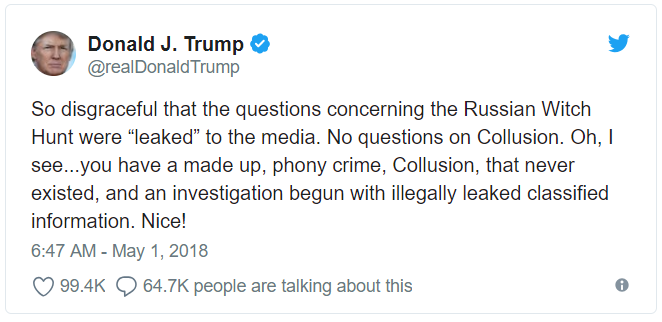Sayeth Trump
Some legal infractions are straight-forward. Speeding — there is empirical evidence that the vehicle which you were driving was moving at 63 miles per hour. The posted speed limit for the road, again empirical evidence, is 45. The line of questioning in this case may be “Were you speeding?”. It’s a lot quicker than asking what speed you were travelling, what the speed limit is on the road, and if your speed exceeded that limit.
Many infractions are not this distinct. Driving too fast for road conditions — that’s a matter of opinion. In fact, a decent argument could be made that someone involved in *most* traffic accidents was driving too fast for road conditions. I had a friend wipe out his motorbike on highway gravel. He was abraded but fine. A cop drove by as he was righting his motorbike, and stopped to help. Eighteen year old kid with a grudge against pretty much everyone mouthed off to the cop sufficiently to be cited for driving too fast for road conditions. Because gravel? That’s a road condition.
Collusion and obstruction of justice both fall into the “not clear cut” category. An unemployed guy notices a business district has a problem with vandalism and offers to patrol the street from 8p-6a for ten dollars an hour because they seem to have a vandal problem. That’s not extortion or racketeering — that’s someone who needs work offering to provide a service someone else needs. An unemployed guy starts vandalizing the business district, then offers to patrol the street from 8p-6a for ten dollars an hour because they seem to have a vandal problem … that’s a protection racket. The prosecution may not directly ask “are you running a protection racket?”. They could delve into how the guy noticed the vandalism problem on multiple occasions, ask questions show how desperate he was for money, ask the guy where he was during the vandalism. That line of questioning doesn’t mean the prosecution doesn’t think he’s running a protection racket. It means they’re asking questions that address all of what differentiates the perfectly innocent first scenario from the criminal second scenario.
In the NYTimes list of questions Mueller is said to have for Trump, there’s a whole section titled “Campaign Coordination With Russia”. Surely not Mueller’s title, but how can anyone reading this list say there are “no questions on collusion”? Because the word doesn’t literally appear!?!
